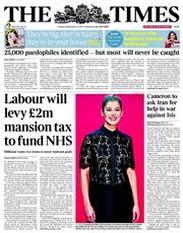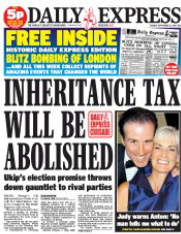Headline-writing customs pay fast and loose with tenses, the past is rendered as present, the pluperfect as the perfect; captions meanwhile have an anachronistic style all their own: "Mrs Bloggs wears a red dress yesterday..." So what's the problem with avoiding the boring old conditional?
Well... both the Times and Express give us fiscal policy news that is apparently set in stone. Labour will impose a mansion tax; inheritance tax will be abolished. The Times is the lesser offender, since the "if it comes to power" is understood. The Express, however, has no sense of attribution, The heading is presented as a bald fact. Only when you read the text do you realise that this is a policy objective of Ukip, a party with no MPs (this month) and which, last time I looked, was not yet on course to form a government.
Looking at the text of the Times splash we find the word "will" used in its correct context: "Ed Miliband will today promise..." It's a leak of his speech, fair enough. But Francis Elliott goes on to use the word willy-nilly to tell us how Labour intends to raise and allocate money to the advantage of the NHS, as though there's no doubt that the party will be elected to office next year.
It's one thing to bend the rules in headings, but a bit of conditionality in the copy would have been nice.




 RSS Feed
RSS Feed


